Last week I looked at the controversy over the effects of coffee – was it an aphrodisiac or did it cause men to become impotent and infertile. This is really a brief follow-up to that post to show that it was not only coffee that men and women worried about in this sense. Tobacco was also thought to be potentially damaging to the reproductive body.
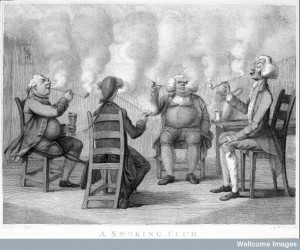 As with tea and coffee, tobacco was thought to have a long list of wonderful virtues – it was in some senses seen as a panacea (a cure-all). Medical texts and herbals did not only focus on the smoking of the plant but described how it could also be used as a salve or an ointment. John Gerard’s Gerard’s Herball or Generall Historie of Plantes explained that ‘Tabaco’ was a remedy for migraines, good for a cold stomach, good against kidney pain, mitigated the pain of the gout, remedies tooth-ache, drives worms from the body, cleanse old and rotten ulcers, was good against scabs and filthiness of the skin, good for the cure of wounds, helped procure sleep, good against the biting of venemous beasts, and it helped the aches of the body.1
As with tea and coffee, tobacco was thought to have a long list of wonderful virtues – it was in some senses seen as a panacea (a cure-all). Medical texts and herbals did not only focus on the smoking of the plant but described how it could also be used as a salve or an ointment. John Gerard’s Gerard’s Herball or Generall Historie of Plantes explained that ‘Tabaco’ was a remedy for migraines, good for a cold stomach, good against kidney pain, mitigated the pain of the gout, remedies tooth-ache, drives worms from the body, cleanse old and rotten ulcers, was good against scabs and filthiness of the skin, good for the cure of wounds, helped procure sleep, good against the biting of venemous beasts, and it helped the aches of the body.1
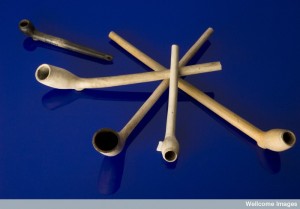 So for the most part it would seem like smoking was considered entirely beneficial, when done in moderation. However, it was again in relation to the delicate vitality of the sexual body that concerns were raised about the smoking of tobacco. In this case it was thought that smoking could be harmful to both men and women. John Parkinson’s Theatrum Botanicum noted that ‘the Women in America forbeare the taking of Tobacco, because that they have beene taught that it will hinder conception and bodily lust.’2
So for the most part it would seem like smoking was considered entirely beneficial, when done in moderation. However, it was again in relation to the delicate vitality of the sexual body that concerns were raised about the smoking of tobacco. In this case it was thought that smoking could be harmful to both men and women. John Parkinson’s Theatrum Botanicum noted that ‘the Women in America forbeare the taking of Tobacco, because that they have beene taught that it will hinder conception and bodily lust.’2
The effects in men were considered to be just as dire by John Chamberlayne. He wrote in The Natural History of Coffee, Thee, Chocolate,Tobacco that the smoking of tobacco was forbidden in the Turkish dominions under the most severe penalities because ‘the Turks having an opinion amongst them, that Tobacco will make them Effeminate, and Barren, unfit for War, and Procreation’.3 Although, he noted, some thought this was merely a political move to stop the sale of tobacco in eastern countries. 4
The same satirical pamphlets that lamented the effects of coffee upon male vigour also included tobacco in their complaints. As with coffee, tobacco was thought to be hot and dry, it thus dried out the male body. Importantly this dried up and consumed their seed (sperm) and so rendered them impotent and infertile: The City-Wifes Petition, Against Coffee thus argued that
‘can any Woman of sense or spirit endure with Patience, that when privileg’d by Legal Ceremonies, she approaches the Nuptial Bed, ex|pecting a Man that with sprightful Embraces, should Answer the Vigour of her Flames, she on the contrary should only meet A Bed full of bones, and hug me a[?]ger useless Crops rendred as sapless as a Kix, and dryer than a Pumice-Stone, by the perpetual Fumes of Tobacco, and bewitching Effects of this most pernitious Coffee,whereby Nature is Enfeebled’. 5
Smoking was also lambasted in specialist pamphlets. The Women’s Complaint Against Tobacco, was effusive in deriding the damage that smoking did to men’s fertility and vigour. The opening of the pamphlet was one woman’s long complaint that her husband was both ‘feeble’ in his sexual actions and infertile:
‘Neighbours and Friends quoth she, I have been married to my Husband about fourteen years, this Man hath been all his time a great Smoaker, and to tell you the truth I was never got with child by him but once, and that was so feebly done, that I may boldly say it was not half gotten, though he is a Man as likely as any of his Neighbours, and as for my own part I am sure I am not in the least defective, but am as apt and fit for the work of generation as any of my Neighbours, nay I may say as likely to be got with child as any Woman in England, let the other be what she will, yet this Man cannot do the feat, and the reason why it is not done, I must clearly impute to his smoaking that Infernal Indian Weed, which they call Tobacco, as for example. My next Neighbour Mrs. Twattle, her Husband and she have been married but nine years, and she has brought him nine brave lusty Children, well gotten Children, and the reason is, because her Husband never takes Tobacco; this I think may be a strong evidence that this filthy Weed is altogether destructive to procreation and robs a Woman of that sweet natural delight, which she ought to receive from her Husband or from some body else: Thus much I can testifie of my self, which I desire you would take into consideration, and proceed to further Judgement according to your best knowledge’. 6
The pamphlet went on to play on the popular concern about ‘cuckoldry’, where impotent husbands who could not satisfy their wives forced to sit back as their wives found sexual satisfaction with other partners: ‘for I could dispence with two or three such Men as my Husband;Alas, what is once in three Weeks? or once a Month for a young brisk Woman who could willingly enjoy a Man every night’. 7
All of these concerns were summarised in a poem (brought to my attention in the comments below by Jo Esra) by William Vaughn in the Approved Directions for Health (1612) who claimed that:
Tobacco that outlandish weed
Doth spend the braine and spoile the seed.
It dulls the spright, it dimmes the sight,
It robs a woman of her right.
Again then, these pamphlets played upon the concerns about the appropriate relationships between men and women. They drew upon medical and botanical information that also declared that tobacco could cause impotence and infertility. In doing so they again demonstrate the early modern understanding that sexual ability and potency was a delicate state easily lost by excessive consumption of the wrong substances.
__________________
1 John Gerard, Gerard’s Herball or Generall Historie of Plantes (London, 1633), p. 359. See also, Nicholas Culpeper, The English Physitian, or An Astrologo-physical Discourse … (London, 1652), p.224.
2 John Parkinson, Theatrum Botanicum … (London,1640), p. 712.
3 John Chamberlayne, The Natural History of Coffee, Thee, Chocolate,Tobacco (London, 1682), p. 23
4 Ibid
5 Anonymous, The City-Wife’s Petition Against Coffee … (London, 1700), p.1.
6 Anonymous The Woman’s Complaint Against Tobacco … (London, ), p.1.
7 Ibid, p. 2.
© Copyright Jennifer Evans, all rights reserved
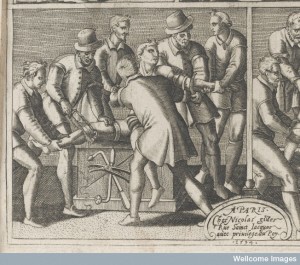
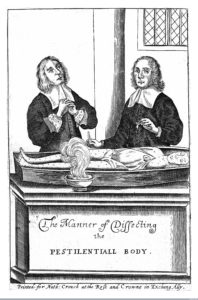
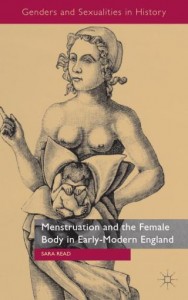
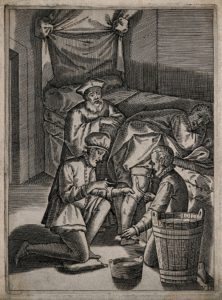
Tobacco, Tobacco Sing sweetly for Tobacco,
Tobacco is like love, O love it
For you see I will prove it.
Tobias Hume, The First Part of Ayres or the Musicall Humours (1605) No.3
http://www.youtube.com/watch?v=lkewwUdmfhs
A very early song about tobacco, but also the earliest use of the Baroque ground bass that I know of.
Brilliant simply Brilliant!
I had better leave it at that for now. I’m sure you know why.
Excellent post! So THAT is what William Vaughan was referring to when urging his reader to ‘ruminate and repeate over these moderne rythmes’:
Tobacco that outlandish weed
Doth spend the braine and spoile the seed.
It dulls the spright, it dimmes the sight,
It robs a woman of her right.
(Approved Directions for Health, 1612)
Jo that perfectly encompasses the complaints they had – I may have to add that in to the post
His rhyme about ‘the abuse of this forraine hearbe’ is at the bottom of p. 81 Jen
—- ” the early modern understanding that sexual ability and potency was a delicate state easily lost by excessive consumption of the wrong substances.”
How did the effect of the non-naturals on sexuality differ from their effect on everything else?
Tobacco’s extreme heat and dryness (in a humoral rather than an everyday sense) placed it in the same section of the classification of the non-naturals as rage, desiccating the radical moisture of the brain and resulting in melancholia adust, even in those of a phlegmatic constitution.
I don’t recall the details of Mayerne’s diagnosis of Harriott’s cancer. A winter sea voyage to Virginia should have been prescribed.
Of course all of the non-naturals could change the health of the body and indeed emotional troubles were considered to be a cause of barrenness and impotence. However, for a non-historical audience who aren’t familiar with the early modern period I think it sometimes needs to be pointed out how precarious the body was thought to be. The idea of a ‘neutral’ body – that was not entirely healthy but had not succumb to a particular illness – emphasises this as well.